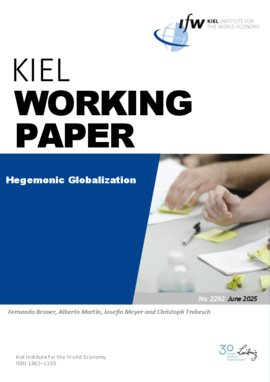Autoren
Erscheinungsdatum
JEL Classification
Schlagworte
How do shifts in the global balance of power shape the world economy? We propose a theory of alignment-based “hegemonic globalization”, built on two central premises: countries differ in their preferences over policies (such as the rule of law or regulatory frameworks) and trade between any two countries increases with the degree of alignment in these policies. Hegemons promote policy alignment and thereby facilitate deeper trade integration. A unipolar world, dominated by a single hegemon, tends to support globalization. However, the transition to a multipolar world can trigger fragmentation, which is particularly costly for the declining hegemon and its closest allies. To test the theory, we use international treaties as a proxy for alignment and compile a novel “Global Treaties Database”, covering 77,000 agreements signed between 1800 and 2020. Consistent with the theory, we find that hegemons account for a disproportionate share of global treaty activity and that treaty-signing is a leading indicator of increasing bilateral trade.





